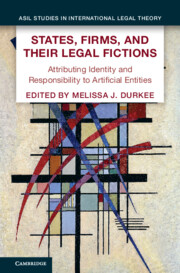 States, Firms, and Their Legal Fictions
States, Firms, and Their Legal Fictions The Limits of Using Reputational Sanctions to Punish Corporate Misconduct
from Part II - Transnational Attribution
Published online by Cambridge University Press: 29 February 2024
When corporations engage in misconduct, we rely on two types of sanctions to discipline them: legal and reputational. For various reasons, both types of sanctions have limitations. This chapter argues that a combination of legal and reputational sanctions for corporate misconduct can help to improve the effectiveness of blame attribution, deliver meaningful punishment for misconduct, and foster organizational change. For example, legal sanctions through lawsuits and government fines can trigger reputational sanctions that can unleash a subsequent wave of monetary costs because the publicity associated with the lawsuit or government fine can lead a corporation’s stakeholders to re-evaluate their relationship with it. Alternatively, legal rules can facilitate the operation of reputational markets by increasing information flows and thereby improving attribution of conduct to particular companies.
To save this book to your Kindle, first ensure [email protected] is added to your Approved Personal Document E-mail List under your Personal Document Settings on the Manage Your Content and Devices page of your Amazon account. Then enter the ‘name’ part of your Kindle email address below. Find out more about saving to your Kindle.
Note you can select to save to either the @free.kindle.com or @kindle.com variations. ‘@free.kindle.com’ emails are free but can only be saved to your device when it is connected to wi-fi. ‘@kindle.com’ emails can be delivered even when you are not connected to wi-fi, but note that service fees apply.
Find out more about the Kindle Personal Document Service.
To save content items to your account, please confirm that you agree to abide by our usage policies. If this is the first time you use this feature, you will be asked to authorise Cambridge Core to connect with your account. Find out more about saving content to Dropbox.
To save content items to your account, please confirm that you agree to abide by our usage policies. If this is the first time you use this feature, you will be asked to authorise Cambridge Core to connect with your account. Find out more about saving content to Google Drive.